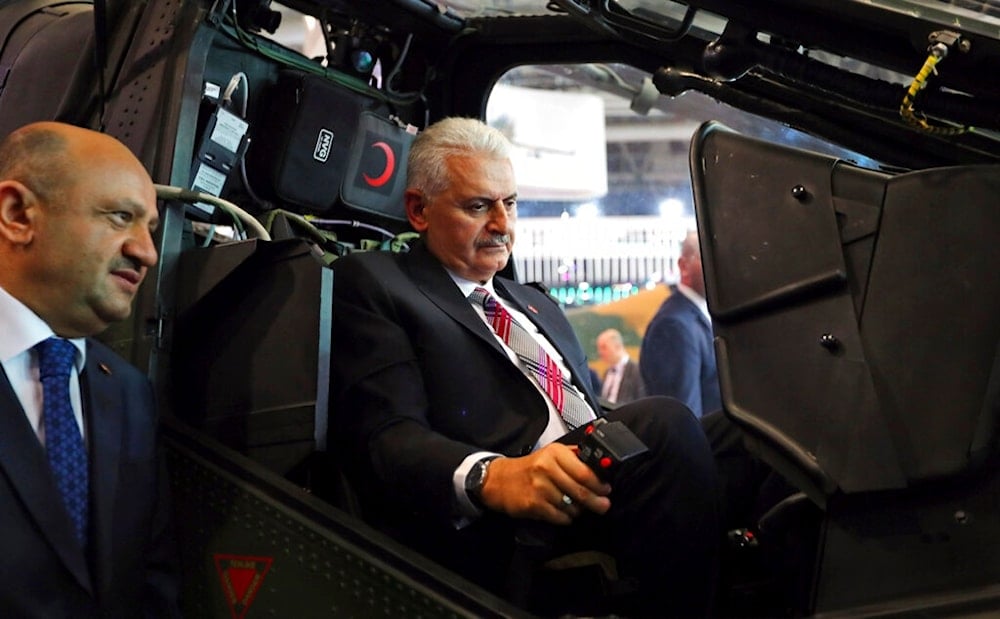Turkey unveils hidden missile system in cargo container at IDEF
Roketsan revealed a Kara Atmaca missile launcher hidden in cargo containers at IDEF 2025, offering stealth deployment and 300 km strike range.
-

Turkey's Prime Minister Binali Yildirim, centre, sits at a helicopter gunship, during a visit at the IDEF’17, the International Defence Industry Fair in Istanbul, as Turkey's Defence Minister Fikri Isik, left, looks on, Tuesday, May 9, 2017 (AP)
Turkish defense firm Roketsan has revealed a new missile launch platform disguised as a standard cargo container, significantly enhancing the element of surprise in modern warfare. The system was unveiled at the ongoing IDEF 2025 international defense exhibition in Istanbul, which runs from July 22 to 27 at the Ataturk Airport venue.
The camouflaged launcher is designed to fire up to six Kara Atmaca surface-to-surface cruise missiles from either a six-meter or 12-meter shipping container. With a range of up to 300 kilometers (approximately 186 miles), the Kara Atmaca missile targets stationary objects and is built to resist electronic jamming.
Concealed strike capability
The containerized format makes the launcher indistinguishable from commercial cargo, presenting serious challenges for enemy detection. This innovation opens the door to potentially unexpected or precision pre-emptive strikes, as it can be transported discreetly and rapidly deployed on tactical wheeled vehicles.
Each missile in the system is six meters in length and weighs 890 kilograms, combining size and stealth with guided accuracy. The Kara Atmaca system reflects Turkey’s growing focus on mobile, concealed, and survivable strike capabilities.
Held biennially, the International Defense Industry Fair (IDEF) brings together global defense stakeholders. This year’s edition has drawn more than 230 delegations from over 100 countries. Among the event’s key developments, Turkey signed a major agreement with Indonesia for the export of its next-generation KAAN fighter jets.
Rising Turkish military role
Turkey’s defense clout is reshaping its strategic position in Europe, according to The Financial Times.
Turkey’s military resurgence, underpinned by a self-sufficient defence industry and a posture of assertive diplomacy, has become too strategically important for Europe to ignore.
While NATO recalibrates in response to Russian aggression, Turkey has emerged as an indispensable security actor, even as concerns grow over Erdoğan’s domestic authoritarian drift.
A frontline guardian for of a NATO flank
The Financial Times described how Turkey, once sidelined by stalled EU accession talks, is now seen as a frontline guardian of NATO’s south-eastern flank. Erdogan, sensing this geopolitical shift, recently declared that “European security cannot be thought of without Turkey... especially with its defence industry,” even as Western governments offered little criticism after the arrest of opposition leader Ekrem İmamoğlu.
From Turkey controlling Black Sea access routes to deploying its forces in conflict zones such as Libya and Somalia, Turkey’s military has been battle-hardened. Rathbone and Foy emphasize that, in contrast to Europe’s slow mobilization of forces, the Turkish army, NATO’s largest on the European continent with 355,000 active troops, could swiftly field an effective peacekeeping operation if asked to do so in Ukraine.
Erdogan’s approach to the Ukraine war remains “balanced,” maintaining open trade and diplomacy with Moscow while simultaneously supplying Kiev with military support. This balancing act boosts Erdogan’s leverage in Brussels as he attempts to reopen EU negotiations, according to the Financial Times.

 3 Min Read
3 Min Read










